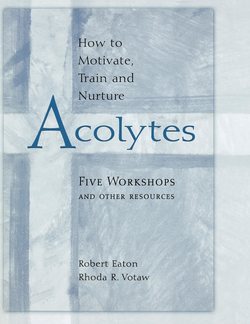Читать книгу How to Motivate, Train and Nurture Acolytes - Robert Ormston Eaton - Страница 9
На сайте Литреса книга снята с продажи.
Training Theory
ОглавлениеThe goal of training is to help acolytes retain information that is important, to help them do their jobs, and, even more important, to understand and internalize the significance of their ministry. To that end, we suggest developing a training program built around the workshops in this book. Combining group activities, one-on-one training, and lots of peer interaction, these exercises will encourage acolytes to:
pay attention to the material being presented;
think about what they are doing and why they are doing it;
observe what is going on in liturgies and the acolytes’ roles in them
relate to one another and build a solid community that is centered around service.
Workshop training—like all good teaching—is most effective if it has three characteristics:
a flexible plan;
regular repetition of key points;
full participation of all members of the group.
There will be, of course, distractions. Attendance will not always meet your expectations, and the inevitable changes that take place when clergy or acolytes come to or leave a parish can be unsettling and confusing; however, by accepting these realities as a part of life, you will find that the program still works.
The need for flexibility, sometimes described as “spontaneous creativity,” can be threatening to leaders. It is, however, an essential ingredient when working with young people as you try to foster their interest in understanding and working within the complicated and often uneven traditions of the Church. Your responsiveness to their learning patterns—your flexibility—will reflect your interest in their journey—and indeed will reflect your own youth.
Flexibility in the workshops also is important because acolytes in one parish may well represent a variety of church backgrounds. That diversity would certainly be evident in diocesan workshops. What may be a basic responsibility, practice, or understanding in one congregation may be optional or even unheard of in another.
Repetition of basic principles must be a part of every training experience and should not be neglected, regardless of the acolytes’ experience or expertise. In workshops and small groups, the acolytes’ growth in their understanding of common denominators such as candles, offering plates, and processional crosses should be identified and recognized. At the same time their understanding should be challenged by representing these basic concepts from different perspectives. We suggest techniques that can be used to make the necessary repetition of basic principles more interesting and engaging.
In each workshop participation of acolytes at all levels of experience is strongly encouraged. Workshops should be designed so beginners learn from experienced acolytes, and those who “know the ropes” have the opportunity to train beginners. Constant interaction among experience levels gives acolytes opportunities to learn nuances of their ministry that trainers might not think to offer.
Once upon a time, during an acolyte festival a young acolyte mentioned the “Sunday School Cross.” When asked what that was, she explained that it was the cross the acolyte uses to lead the Sunday school students into the church at the Peace. Many heads nodded in understanding as she explained how the procession worked, while other people were surprised. Proving that good ideas spread, after the festival at least one parish decided to adopt the Sunday School Cross as part of its tradition.
